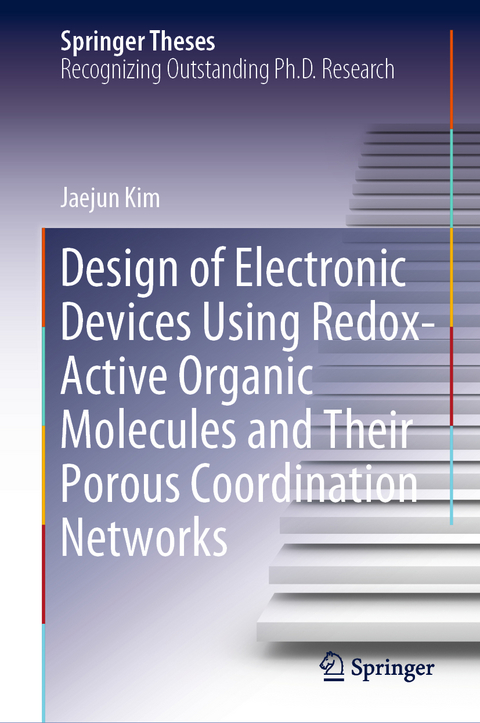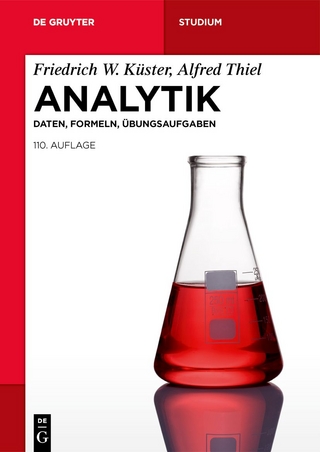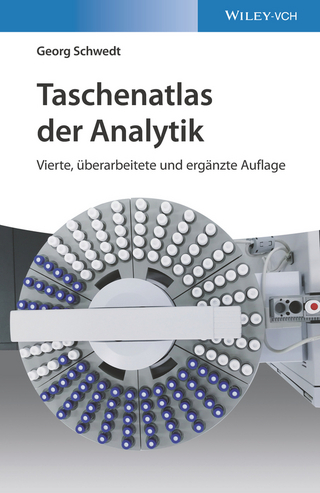
Design of Electronic Devices Using Redox-Active Organic Molecules and Their Porous Coordination Networks
Seiten
2021
|
1st ed. 2021
Springer Verlag, Singapore
978-981-16-3906-7 (ISBN)
Springer Verlag, Singapore
978-981-16-3906-7 (ISBN)
This book addresses the development of electronic devices using redox-active organic molecules and their porous coordination networks (PCNs), and highlights the importance of the molecular arrangement.
Redox-active organic molecules hold considerable promise as flexible electronic elements, because their electronic state can easily be controlled using external energy. Although various kinds of redox-active organic molecules have been synthesized, attempts to apply them to electronic devices have been limited, owing to the lack of proper structural design. Moreover, ligand-based redox-active PCNs remain largely unexplored because of the limited availability of redox-active ligands. In addition to developing new redox-active organic molecules, in order to design electronic devices based on these molecules/PCNs, it is essential to understand the connections between their molecular arrangement, electrical properties, and redox activity.
In this thesis, the redox-active organic molecule 2,5,8-tri(4-pyridyl)1,3-diazaphenalene (TPDAP), which features a large pi plane and multi-intermolecular interactivity, is used to develop a resistive switching memory device. In addition, its PCNs are synthesized to fabricate chemiresistive sensors, and the electrical properties are modulated using post-synthetic modification. Each mechanism is systematically investigated by means of structural determination and well-defined control experiments. Subsequently, the book proposes general guidelines for designing electronic devices using redox-active organic molecules.
The book will appeal to a broad range of readers, from basic scientists to materials engineers, as well as general, non-expert readers.
Redox-active organic molecules hold considerable promise as flexible electronic elements, because their electronic state can easily be controlled using external energy. Although various kinds of redox-active organic molecules have been synthesized, attempts to apply them to electronic devices have been limited, owing to the lack of proper structural design. Moreover, ligand-based redox-active PCNs remain largely unexplored because of the limited availability of redox-active ligands. In addition to developing new redox-active organic molecules, in order to design electronic devices based on these molecules/PCNs, it is essential to understand the connections between their molecular arrangement, electrical properties, and redox activity.
In this thesis, the redox-active organic molecule 2,5,8-tri(4-pyridyl)1,3-diazaphenalene (TPDAP), which features a large pi plane and multi-intermolecular interactivity, is used to develop a resistive switching memory device. In addition, its PCNs are synthesized to fabricate chemiresistive sensors, and the electrical properties are modulated using post-synthetic modification. Each mechanism is systematically investigated by means of structural determination and well-defined control experiments. Subsequently, the book proposes general guidelines for designing electronic devices using redox-active organic molecules.
The book will appeal to a broad range of readers, from basic scientists to materials engineers, as well as general, non-expert readers.
1. General Introduction.- 2. Resistive Switching Memory Devices Based on a Redox-active Organic Molecule.- 3. Humidity Detection Based on Redox-active Porous Coordination Networks.- 4. Tunable Electrical Properties of Redox-active Porous Coordination Networks via Post-synthetic Modification.- 5. Summary and Outlook.
| Erscheinungsdatum | 03.09.2021 |
|---|---|
| Reihe/Serie | Springer Theses |
| Zusatzinfo | 45 Illustrations, color; 12 Illustrations, black and white; XIV, 76 p. 57 illus., 45 illus. in color. |
| Verlagsort | Singapore |
| Sprache | englisch |
| Maße | 155 x 235 mm |
| Themenwelt | Naturwissenschaften ► Chemie ► Analytische Chemie |
| Naturwissenschaften ► Chemie ► Organische Chemie | |
| Technik ► Elektrotechnik / Energietechnik | |
| Technik ► Maschinenbau | |
| ISBN-10 | 981-16-3906-X / 981163906X |
| ISBN-13 | 978-981-16-3906-7 / 9789811639067 |
| Zustand | Neuware |
| Informationen gemäß Produktsicherheitsverordnung (GPSR) | |
| Haben Sie eine Frage zum Produkt? |
Mehr entdecken
aus dem Bereich
aus dem Bereich


